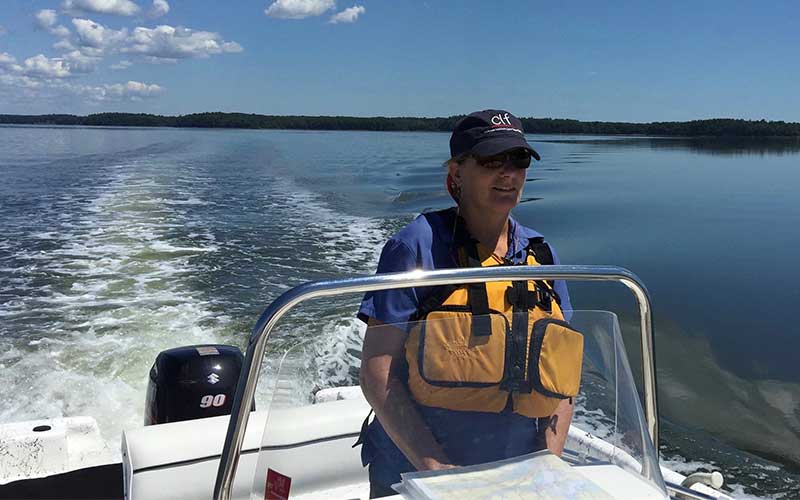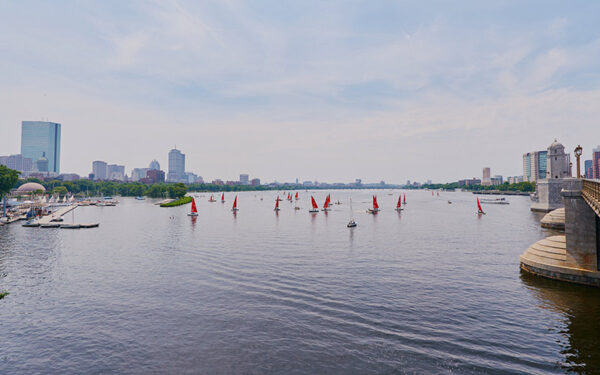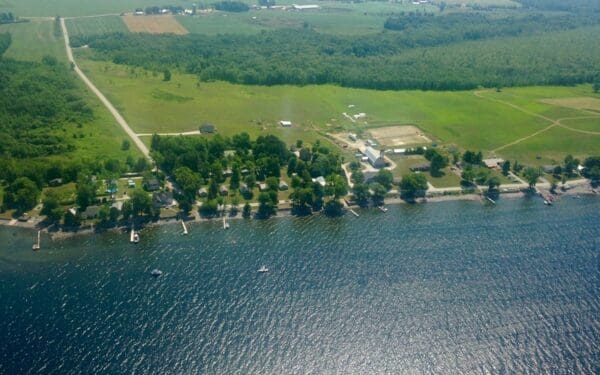
This summer, I'll be back on the Waterkeeper boat working with Seacoast communities to protect the Great Bay–Piscataqua Estuary. Photo: Ellie Batchelder
Here in New Hampshire and southern Maine, the Great Bay–Piscataqua Estuary is our region’s “hidden coast.” This complex and beautiful body of water is made up of seven rivers, bays, and the shore, with waters that flow through 52 towns in two states out to the open ocean. As I prepare to launch CLF’s Waterkeeper boat this season, I’m reminded that these waterways are at the heart of what makes the Seacoast region so special.
But the Great Bay is at a tipping point. Sewage, rain runoff, and other pollution are damaging this fragile ecosystem. Climate change is warming its waters and disrupting the plant and animal species that depend on it. And the Gulf of Maine, which the Great Bay flows out to, is heating up faster than 99 percent of the world’s largest bodies of saltwater.
Much work is underway to reverse the downward spiral in the estuary, but community action is key to ensuring a healthy ocean and saving the Great Bay. This summer, I will be out across the estuary, working with community leaders, activists, students, scientists, and elected officials to turn the tide on pollution and restore our precious estuary to health.
The Threat of Nitrogen Pollution
One of the biggest threats to the Great Bay estuary is too much nitrogen in the water. While some nitrogen is necessary and natural, too much can destroy an ecosystem.
Huge amounts of nitrogen flow into the Great Bay from wastewater treatment facilities and septic systems, road runoff, lawn fertilizers, and even pet waste that owners haven’t picked up and properly disposed of.
Water laden with these pollutants flows into the estuary with every rainstorm. Once in the water, nitrogen causes an explosion of microscopic algae and seaweeds, making the water cloudy and inhospitable to the native seagrasses that once carpeted the estuary. At its worst, nitrogen pollution stimulates so much algae that it smothers the bottom of the bay, depleting oxygen that native fish and shellfish need to survive.
Nitrogen Pollution is a Solvable Problem
The good news is there are solutions to nitrogen pollution. About one-third of the nitrogen troubling the Great Bay Estuary comes from wastewater treatment facilities. We have worked with Seacoast residents to pressure the Environmental Protection Agency (EPA) to strictly regulate the amount of pollution discharged by these facilities. As a result of our advocacy, EPA now requires cities and towns around the estuary to do a much better job at treating sewage. Sewage plant upgrades are underway in many communities – in fact, Exeter’s new facility will come on line this summer and Portsmouth’s new plant will be completed in 2020.
But we can’t stop there. As climate change warms Great Bay’s waters, we will see more frequent algae outbreaks and new kinds of diseases. With the recent reports from the International Panel on Climate Change and the National Climate Assessment, we know that we must do more to prepare for rising temperatures and changing ecosystems. Instead of taking action, however, the current federal agenda has rolled back protections for our wetlands, estuaries, oceans, and coasts. This makes advocacy and involvement at the local level even more important.
Local Actions Prepare for Climate Change
If there’s one thing I’ve learned in my two years as the Great Bay–Piscataqua Waterkeeper, it’s the power of local voices to create change.
I’ve been privileged to work alongside many communities of advocates who show up and speak out at town councils and planning board meetings, and press for important local action for clean water. I’ve taken our elected officials out on the water to show them the issues facing the Great Bay estuary firsthand. And I’ve worked with dedicated volunteers on coastal cleanups who have helped clear tons of trash from miles of Great Bay shoreline. (Stay tuned: we’ll be holding three coastal cleanups this summer, all open to the public). We’re building communities of concern and will continue advocating for scientifically grounded policies that protect our oceans and coasts.
You Can Help Save the Great Bay–Piscataqua Estuary
Healthy oceans and freshwater ecosystems are a critical part of healthy communities and economies from coast to coast. You can be a part of our campaign to save what makes the Seacoast so special.
Join us to advocate for fewer toxic pesticides and fertilizers on city streets, parks, and sports fields. Volunteer for coastal cleanups to keep marine trash from littering our shores and polluting our waters. Help us by speaking out – at the local, state, and national level – about why you care and will fight for healthy waters in the Piscataqua region and across New England.
There’s no time to waste. Learn what you can do in your community to fight for clean water on the Seacoast by joining our Facebook group “Save the Great Bay – Piscataqua Estuary.”



